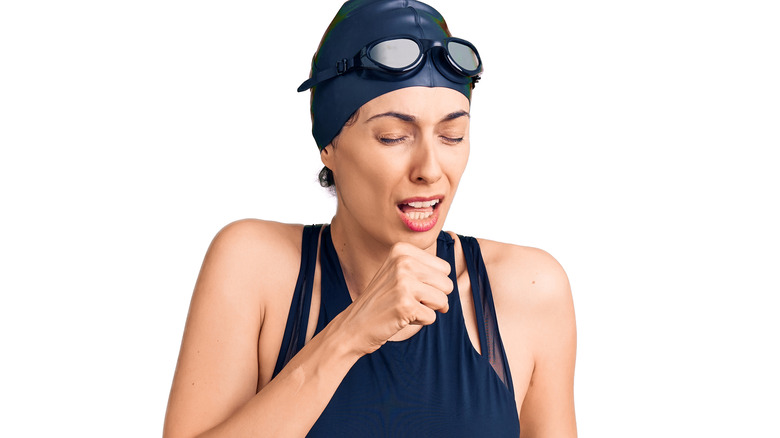What It Really Means When Your Lungs Hurt After Swimming
Whether you're a competitive swimmer or you simply swim for fun, at one point or another, you may have climbed out of the pool after a refreshing dip only to feel some discomfort in your lungs. Depending on the cause, post-swimming lung discomfort may be temporary, while in other cases, it may require medical attention.
Experts at the Cleveland Clinic explain that exposure to chlorine from indoor pools can potentially cause lung irritation. Such symptoms include wheezing, coughing, or even possible changes in the protective mucus lining of the lungs, as one 2020 study suggests. As opposed to well-ventilated outdoor pools, some indoor swimming pools contain a mixture of chlorine and ammonia that sits above the water. Inhaling the mixture as swimmers come up for air can aggravate symptoms in those with allergies.
Alternatively, if you find that your lungs hurt after swimming, you may be experiencing exercise-induced bronchospasm (EIB), according to FamilyDoctor.org. Similar to exercise-induced asthma, the condition is sometimes also referred to as exercise-induced bronchoconstriction. Triggered by stretches of exercise, or the inhalation of cold or dry air, the air passages constrict and can cause tightness in the chest. Symptoms can be managed with medication, as well as adjusting one's workout routine.
What is swimming-induced pulmonary edema?
In more severe cases, pain in the lungs from swimming can be an indication of swimming-induced pulmonary edema (SIPE), reports the American College of Cardiology. The condition is characterized by a heightened state of pulmonary vascular pressure. Studies show the condition is often triggered in association with cold water swimming. A 2004 study published in the British Journal of Sports Medicine examined the case of a 36-year-old healthy male in training for a triathlon who was diagnosed with SIPE after he began to experience shortness of breath while swimming in open water. His respiratory distress reportedly worsened after he opened his wetsuit and exposed himself to the cold seawater. Experts at the American College of Cardiology explain that common symptoms seen in association with SIPE include labored breathing, cough, coughing up blood, wheezing, and tightness in the chest.
In the event that a swimmer experiences swimming-induced pulmonary edema, you'll want to get the individual out of the water promptly and move them to a warm environment, advises the American College of Cardiology. Additionally, wetsuits should be taken off if they're wearing one. As a potentially life-threatening condition, some cases of SIPE may require supportive oxygen or medication treatment.

